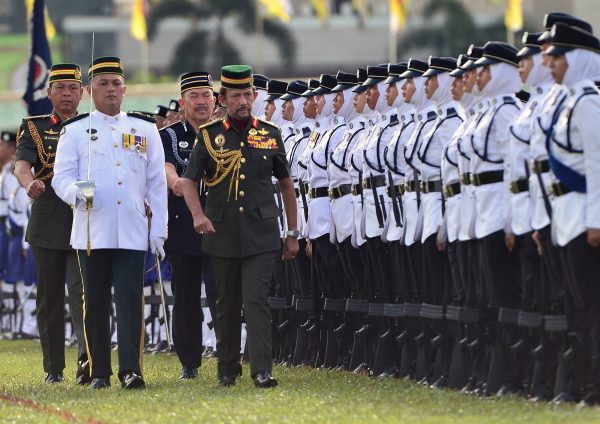The Sultan who had long kept his nation’s draconian laws under the radar of international scrutiny was now firmly in global sights.
Given that death by hanging had long been in Brunei’s common law-derived penal code, the outpouring of negative reactions to the new liwat law would have surprised Sultan Hassanal Bolkiah. Several other Syariah Penal Code (SPC) offences that mandate the death penalty, including stoning for zina — consensual intercourse outside of marriage — and execution for blasphemy also commenced.
Brunei’s common law had for a century criminalised consenting homosexual acts and in 2017 increased the maximum penalty from 10 to 30 years, with whippings. This passed without comment, but the antiquated concept of stoning was a bridge too far for a vigilant and vocal worldwide LGBT movement.
Despite being unwilling to back down on the righteousness of any Syariah law ‘ordained by Allah’, the Sultan placated international critics by announcing a moratorium on the death penalty by stoning. It was a small concession as Brunei already had a general moratorium on the death penalty. But neither the SPC nor the step-by-step stoning procedure in the accompanying criminal procedure order were repealed or amended. The moratorium silenced most critics and talk of sanctions and boycotts ended. Brunei slipped under the radar again.
Interestingly, the new law also received little public comment in Brunei.
The government gave little advance warning of commencement. Three days prior to the law coming into effect, a statement from the office of the Prime Minister — a role also held by the Sultan — noted that the final stages of the SPC would commence on 3 April 2019. This belied the momentous legal change about to occur.
For the first time in Brunei’s history, all would be subject to punishments under Islamic law known as hudud, of which liwat is just one offence. Punishments such as amputations for theft, physical mutilations and proportional monetary compensation were also instituted. But the changes were kept so low key that the Borneo Bulletin did not report on it. Ten days later the Ministry of Religious Affairs validated the new laws as not ‘man-made, but ordained by Allah’. International criticism was deflected as a ‘misunderstanding’ and Brunei’s full commitment to the Universal Declaration of Human Rights reaffirmed. The contrast in coverage between the international and local media was stark.
Censorship legislation is rife in Brunei, including the Sedition Act, the Internal Security Act, the Newspaper Act and now the SPC. These laws create a pervasive culture of self-censorship. Brunei’s government-owned internet service provider also closely monitors the internet and forbids content that may be subversive, promote ‘illegitimate reform’, incite disharmony or instability, or is not aligned with ‘religious values, social and societal norms’. Courts also cannot consider the constitutionality of any legislation. Judicial review was abolished in 2004 and only the Sultan can hand-pick a committee to interpret its Constitution.
Significant changes to Brunei’s legal landscape are never publicly debated. In this case, there was no consultation with the people of Brunei — Muslims and non-Muslims — who could be majorly impacted. This is lawmaking by royal fiat. The legislative vehicle the Sultan used for this, and many laws, is the Emergency Order.
Since 1962, Brunei has been in a perpetual state of emergency. The Sultan renews the emergency every two years.This means he can make any ‘orders whatsoever which he considers desirable in the public interest’ while constitutional preconditions such as public danger, war or international threat are ignored. This constitutionally questionable practice escapes international scrutiny.
When Fiji declared a state of emergency in 2009, suspended elections and restricted free speech and assembly, the international community was quick to condemn Fiji and expel it from the Commonwealth. Yet for more than 60 years Brunei has not held elections for its parliament, continues law-making by emergency orders and restricts press freedom. The Sultan is warmly embraced by the Commonwealth and his abuse of emergency powers is rarely criticised outside academia.
The government’s full control over Islam further prevented internal comment on the liwat law and other changes. The diversity of voices, interpretations and practices seen across the Muslim world are excluded by Brunei’s constitution that confines its laws and policies to the orthodox Shafi’i school of Islamic law. The Sultan publicly condemns religious pluralism and Islamic liberalism. To express an alternative view on a Quranic text risks the pejorative label of deviancy. Under the SPC this can lead to a charge of blasphemy, heresy, and if it is a central tenet, apostasy.
Censorship, lawmaking by royal fiat and state control on Islam highlight why there was scant public reaction within Brunei to the April 2019 announcement. And as the Sultan probably sensed would happen, international criticism has now ceased after the issue fell out of the headlines. LGBT Bruneians remain silent and hidden. Whether stoning is ever implemented or not, the message sent is clear. LGBT people in Brunei are afraid to canvas for equality, recognition or basic rights, which their nation — as a signatory to the UN Charter — is obligated to give.
Ann Black is Associate Professor at The University of Queensland’s School of Law.


Out of all topics, you brought a dead, inactive law of that country since.. last year. Theres no stoning, no penal code carried out, nothing at all.
Imagine living in a country where you could be put to death for having sex. It’s on the books. The spectre is there but there are no worries because nothing is carried out.
Your reply Henry, lacks humanity.